English Words in Action, Group A
(a variety of English words which have developed through history and are currently used in our modern age)
Simply click on this banner (or the following link) and you will be on your way to stimulate your brain for greater word comprehension with quizzes based on some of the words in this unit.
While Rodger was walking along the dark street late at night, his brain was addled by fear of what might happen to him.
2. To rot, to decay, to putrefy: The eggs were addling because they were not refrigerated and were on the shelf too long.3. Etymology: from a Middle English word from the Old English adela, meaning "liquid filth". It’s related to the German adel, meaning "urine, mire" or "puddle".
There seems to be too many addle-brains who are thinking about running for President of the U.S.
2. Crazy, weak, mentally deficient in some way: Is it possible that the man was addlebrained when someone knocked on his door at the hotel and he opened the door while he was still completely naked after taking a shower?
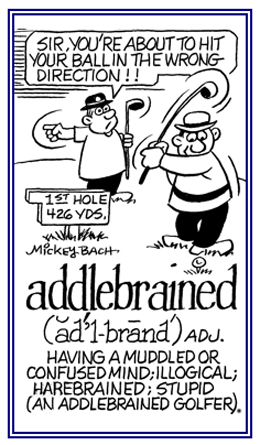
Go to this Word A Day Revisited Index
so you can see more of Mickey Bach's cartoons.
2. A reference to anything that is neutral, neither right nor wrong, or indifferent: The adiaphorous attitude of the student resulted in his failing to pass his exams and no longer getting any financial aid from his parents. 2. Etymology: from Greek adiaphoros, from the negative prefix a + diaphoros, "different"; that is, "making no difference, of no consequence".
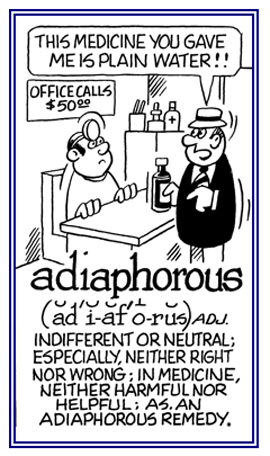

Go to this Word A Day Revisited Index
so you can see more of Mickey Bach's cartoons.
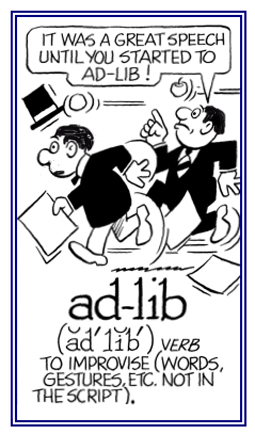
Go to this Word A Day Revisited Index
so you can see more of Mickey Bach's cartoons.

Go to this Word A Day Revisited Index
so you can see more of Mickey Bach's cartoons.
2. Etymology: from Old English gæsten, "frighten," which comes from gæst, "ghost, spirit".
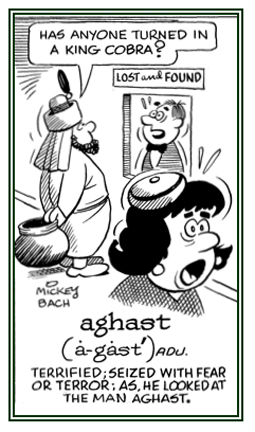
Go to this Word A Day Revisited Index
so you can see more of Mickey Bach's cartoons.
2. Referring to great interest in some action: The news about the new laptops has computer users agog.
3. Etymology: from Old French a gogue, "joke, good humor, joyfulness, merriment"; from gogue, "fun"; of unknown origin.
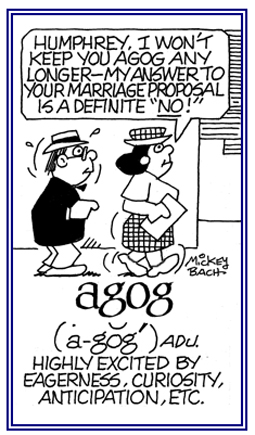
Go to this Word A Day Revisited Index
so you can see more of Mickey Bach's cartoons.
Click on this agrypnotic link, if you want to see more words that are related to it.
2. Etymology: This terminology is considered to be a lawyer's redundancy since abet means the same thing as aid, which gives credence to the old rumor that lawyers used to be paid by the word as illustrated by the following statements as shown below.
To help, assist, or to facilitate the commission of a crime, to promote the accomplishment thereof, to help in advancing or bringing it about, or to encourage, counsel, or to incite as to its commission.
Aid and abet includes all the assistance rendered by words, acts, encouragement, support, or presence, actual or constructive, to render assistance if necessary.
Legally, aiding and abetting describes any and all assistance rendered by words, acts, encouragement, support, or presence, actual or constructive, and to render assistance, if necessary; and are obviously derived from a combination of aid and abet:
- Aid means "to support, to help, to assist, or to strengthen".
- Act in cooperation with; to supplement the efforts of another person or other people.
- Distinguished from abet, aid within the aider and abettor statue means "to help, to assist", or "to strengthen"; while abet means "to counsel, to encourage, to incite, or to assist" in the commission of a criminal act.
2. A quick and cheerful willingness to do something: Dorinda's alacritous acceptance of the invitation to the party surprised her parents.
3. A descriptive term for a certain mood or a tempo of a musical composition, indicating how the music should be played: The concert had several sections of alacritous rhythms.
2. Promptness or eagerness and speedy readiness to respond to something: Bryan answered the call for assistance from his supervisor with alacrity.
3. Agility and nimbleness: Despite Mike's advanced age, he moved around with alacrity.
4. Etymology: from Latin alacritatem, alacritas, "liveliness, ardor, eagerness"; from alacer, alacris, "cheerful, brisk, lively"; of uncertain origin.
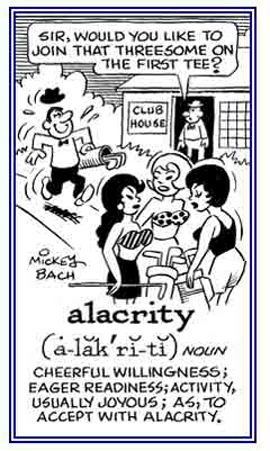


Go to this Word A Day Revisited Index
for a list of additional Mickey Bach illustrations.
2. A security device installed in property; especially, a house or car, to make a warning sound if a break-in or theft is attempted: The new system for the crime-prevention alarms were very loud and so they would help protect the store from criminal invasions.
3. Clocks or watches that will sound off when set: There are time mechanisms that provide alarms for people.
4. Fear caused by the perception of or the sudden sense of imminent danger: Chrissy's parents have expressed alarm about her safety when she goes hiking in the mountains.
5. Etymology: from the old French summons to battle a l'arme!, "to arms!" It seems to be a far cry from the modern alarm clock; yet, that is actually the content of the word's development."
A l'arme! was first the call itself and then, in the form alarme, it became the name of this sudden summons.
The English alarm, which comes from this origin, first had the same meaning, but gradually broadened to indicate a warning signal of any kind of danger, and then the apparatus for giving this signal; such as, a fire alarm.
It is interesting to also note that alarm has developed an additional meaning: the fear which results from a warning of danger.
Links to all of the groups of English words in action, Groups A to Z.
You may see the bibliographic list of sources of information for these words in action.


